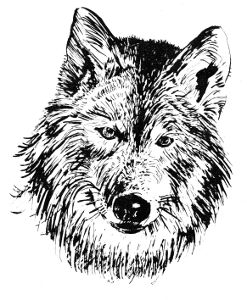
USDA FOREST SERVICE
RESEARCH PAPER NC-52
1971
Ecological
Studies of the
TIMBER
WOLF
in
Northeastern
Minnesota

NORTH CENTRAL FOREST EXPERIMENT STATION
FOREST SERVICE
U. S. DEPARTMENT OF AGRICULTURE
FOREWORD
The largest population of timber wolves remaining in the United States(excluding Alaska) lives in northern Minnesota. Many of these wolves inhabitthe Superior National Forest, so protecting the habitat of this endangeredspecies is largely a Forest Service responsibility.
As the "Age of Ecology" broadens into the 1970's, wolves and wolf habitatwill become a subject of concerted research. Forest land managers will haveto know more about how the timber wolf fits into a forest system. Buildingon nearly 50 years of research in northern forests, we at the North CentralStation intend to expand our studies of wildlife habitat. We are happy topublish the enclosed papers as one step in this direction.
North Central Forest Experiment Station
D. B. King, Director
Forest Service—U.S. Department of Agriculture
Folwell Avenue
St. Paul, Minnesota 55101
ECOLOGICAL STUDIES OF THE TIMBER WOLF
IN NORTHEASTERN MINNESOTA
L. David Mech and L. D. Frenzel, Jr. (Editors)
CONTENTS
| Movements, Behavior, and Ecology of Timber Wolves in Northeastern Minnesota L. David Mech, L. D. Frenzel, Jr., Robert R. Ream, and John W. Winship | 1 |
| An Analysis of the Age, Sex, and Condition of Deer Killed by Wolves in Northeastern Minnesota L. David Mech and L. D. Frenzel, Jr. | 35 |
| The Effect of Snow Conditions on the Vulnerability of White-Tailed Deer to Wolf Predation L. David Mech, L. D. Frenzel, Jr., and P. D. Karns | 51 |
| The Possible Occurrence of the Great Plains Wolf in Northeastern Minnesota L. David Mech and L. D. Frenzel, Jr. | 60 |
THE AUTHORS
Dr. Mech, formerly with the Department of Biology, Macalester College,St. Paul, Minnesota, is now employed by the U.S. Bureau of Sport Fisheriesand Wildlife, Twin Cities, Minnesota.
Dr. Frenzel, formerly with the Department of Biology, Macalester College,St. Paul, Minnesota, is now employed by the Department of Entomology,Fisheries, and Wildlife, University of Minn